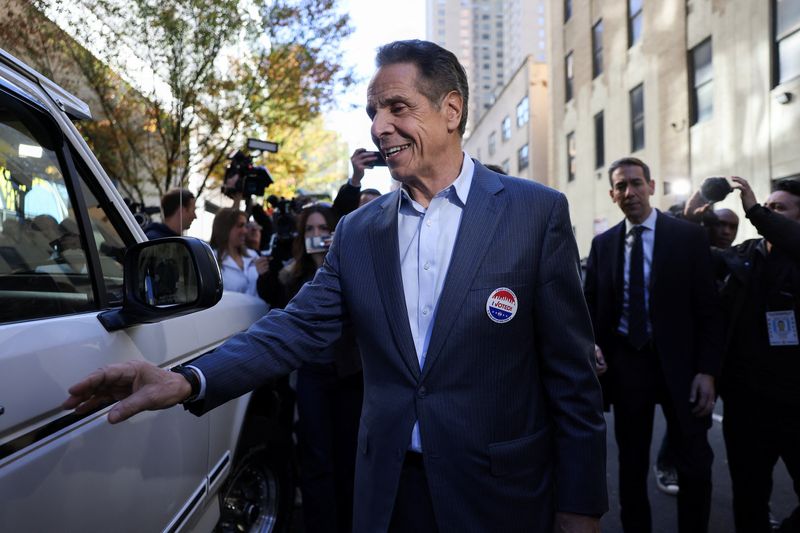By Lewis Krauskopf and Saeed Azhar
NEW YORK (Reuters) -Wall Street braced for change with the election of Democratic Socialist Zohran Mamdani as mayor of New York City on Tuesday, an outcome set to reverberate in the heart of global capitalism as financiers worry about the city’s competitiveness and business appeal.
Investors watching the results of governors’ races in other states were also analyzing wins by Democratic candidates, saying they could be seen as evidence of renewed strength for the party against President Donald Trump’s Republicans ahead of next year’s midterm elections. In Virginia, Democrat Abigail Spanberger easily won the election for governor, becoming the first woman elected to that role. And in New Jersey, Democrat Mikie Sherrill also won the governor’s race by a large margin.
Mamdani’s win “will be an interesting experiment and we’ll see how much he tries to really change New York City and how he is accepted,” said Tim Ghriskey, senior portfolio strategist at Ingalls & Snyder in New York. Looking collectively at the New York City race and the Democratic victories in New Jersey and Virginia, Ghriskey said, “It’s a fairly strong mandate against the administration in Washington.”
Mamdani focused his campaign on affordability. His agenda includes a rent freeze for rent-stabilized apartments, free bus service, universal childcare and city-run grocery stores. His policies also include hiking taxes on New York City’s wealthiest and raising the corporation tax, driving worries among the finance community that the city’s competitiveness will suffer.
While New York’s mayor has no direct oversight over Wall Street, the position sets the tone on perceptions of whether the city is business-friendly.
While many investors and financiers say they can sympathize with the affordability issues Mamdani has raised, they expressed broad misgivings about his tax policies.
“When I look at the economics around the cost of living in New York City and when a one-bedroom apartment in New York City is $5,000 a month, that’s unsustainable,” Phil Blancato, chief market strategist at Osaic in New York, said after the election results. “And whether the rhetoric around what can be done or can’t be done is true or not, that’s the reason for this kind of … victory in New York City. But when you think about the increase in taxes at the small-business level, corporate level … that has a significant impact.”
Some are hopeful that Mamdani will moderate his positions or be confronted by roadblocks while trying to achieve some of his aims.
A Mamdani win is “a risk I’m watching in 2026,” Dean Lyulkin, CEO of Cardiff, a private investment firm and small-business lender in San Diego, California, said ahead of the election being called.
“Actual policy often turns out much more benign than campaign rhetoric, but if other major cities follow this pattern, markets may start pricing in more tax and regulatory risks,” Lyulkin said.
Wall Street leaders are increasingly focusing on how to work with him. Indeed, Mamdani has been engaged directly with business leaders. He spoke with CEOs in meetings organized by the Partnership for New York City, whose members include Wall Street banks, private equity firms and law firms, according to Kathryn Wylde, CEO of the organization.
Yasser Salem, CEO of OneNYC, an independent expenditure committee that backs Mamdani, said last week that he is assembling an advisory council of business leaders to work with Mamdani if he prevails.
Mamdani spokesperson Dora Pekec said the mayor-elect’s affordability agenda is good for the economy, as the childcare provision will help businesses, with employees willing to remain in their jobs and having a higher quality of life.
“It’s important that we have high quality of life for New Yorkers so that they want to keep starting businesses here,” Pekec said.
Some heavyweights in finance poured money into efforts to defeat Mamdani, including high-profile investors Bill Ackman and Dan Loeb. Mamdani’s main opponent was Andrew Cuomo, the former Democratic governor of New York who ran as an independent.
Some saw it as unlikely that Mamdani can achieve drastic change. Worries tied to Mamdani’s victory are “somewhat overexaggerated,” Peter Cardillo, chief market economist at Spartan Capital Securities in New York, said ahead of the election results. Cardillo believes Mamdani will face obstacles when he tries to implement some of his proposals.
Other races, including in Virginia and New Jersey, were seen as key in offering insight into how Americans are thinking about the ongoing U.S. government shutdown and which political party is to blame.
If the Democrats win back control of just one of the chambers of Congress next year, it could cause “gridlock” in Washington that could make policymaking more predictable. Currently, Republicans hold the presidency and majorities in both the Senate and the House of Representatives. Betting website Polymarket shows a 72% chance of Democrats winning the House next year.
Analysts at Deutsche Bank said in a research note on Wednesday that the elections gave an early sign of “an anti-incumbent party swing ahead of the midterms in a year’s time, even if one has to be cautious in the read across from state to federal elections.”
Jamie Cox, managing partner at Harris Financial Group, said the election was a “very big wake-up call for Republicans on the midterms.”
(Reporting by Lewis Krauskopf; Additional reporting by Saeed Azhar, Siddharth Cavale, Maria Tsvetkova, Laura Matthews, Davide Barbuscia and Suzanne McGee; Editing by Megan Davies, Leslie Adler and Mark Porter)



Leave a Comment
Your email address will not be published. Required fields are marked *